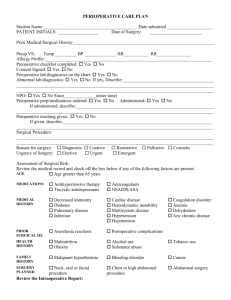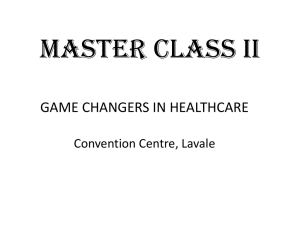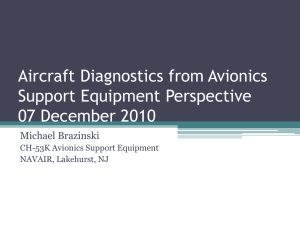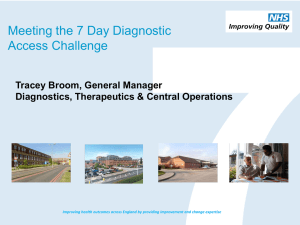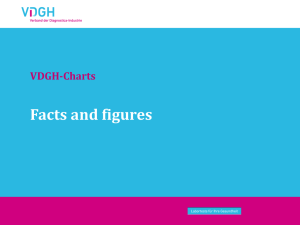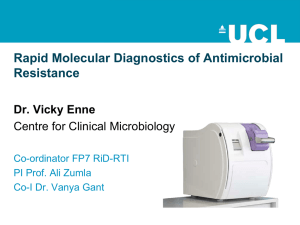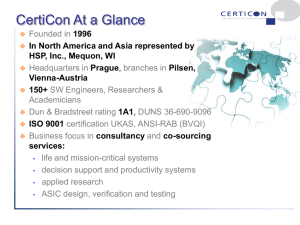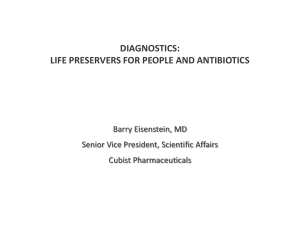Перечень экзаменационных вопросов по хирургическим
advertisement
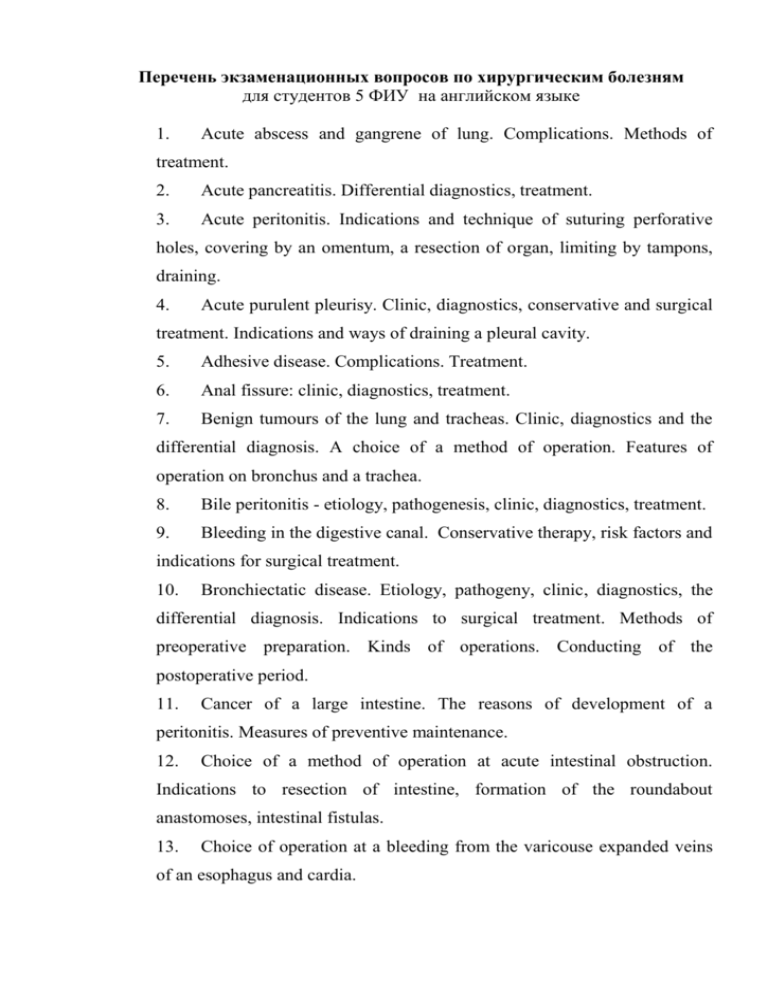
Перечень экзаменационных вопросов по хирургическим болезням для студентов 5 ФИУ на английском языке 1. Acute abscess and gangrene of lung. Complications. Methods of treatment. 2. Acute pancreatitis. Differential diagnostics, treatment. 3. Acute peritonitis. Indications and technique of suturing perforative holes, covering by an omentum, a resection of organ, limiting by tampons, draining. 4. Acute purulent pleurisy. Clinic, diagnostics, conservative and surgical treatment. Indications and ways of draining a pleural cavity. 5. Adhesive disease. Complications. Treatment. 6. Anal fissure: clinic, diagnostics, treatment. 7. Benign tumours of the lung and tracheas. Clinic, diagnostics and the differential diagnosis. A choice of a method of operation. Features of operation on bronchus and a trachea. 8. Bile peritonitis - etiology, pathogenesis, clinic, diagnostics, treatment. 9. Bleeding in the digestive canal. Conservative therapy, risk factors and indications for surgical treatment. 10. Bronchiectatic disease. Etiology, pathogeny, clinic, diagnostics, the differential diagnosis. Indications to surgical treatment. Methods of preoperative preparation. Kinds of operations. Conducting of the postoperative period. 11. Cancer of a large intestine. The reasons of development of a peritonitis. Measures of preventive maintenance. 12. Choice of a method of operation at acute intestinal obstruction. Indications to resection of intestine, formation of the roundabout anastomoses, intestinal fistulas. 13. Choice of operation at a bleeding from the varicouse expanded veins of an esophagus and cardia. 14. Cholangitis. Classification. Clinic, diagnostics, differential diagnostics. Treatment. 15. Chronic abscess lung. The reasons of transition of an acute abscess in chronic. Medicamentous and surgical treatment. Results of conservative and operative treatment. 16. Chronic empyema of the pleuras. The reasons. Clinic, diagnostics, treatment. 17. Cicatricial esophageal narrowing clinic. Diagnostics. Methods of treatment. 18. Classification and clinic of tumours and cyst of mediastinum. A vena cava superior syndrome. Indications and methods of operation. 19. Clinic of cicatricial narrowing of an esophagus. Diagnostics. Methods of treatment. 20. Clinic, diagnostics and choice of a method of surgical treatment of a syndrome of a bringing loop and mechanical obstruction of gastroenteroanastomosis. 21. Clinic, diagnostics and methods of surgical treatment at relapse of a gastric, duodenal, gastroenteroanastomosis ulcer. 22. Clinical picture, diagnosis and methods of surgical treatment for recidive ulcers stomach, duodenal ulcer, peptic ulcer of gastroenteroanastomosis. 23. Complications of an acute pancreatitis, clinic, diagnostics, treatment. 24. Concept about postcholecystectomy syndrome. Classification. Clinic. Diagnostics, principles of treatment. 25. Congenital and traumatic arterial and arteriovenouse aneurysms. Etiology and pathogeny. Clinic, diagnostics, operative treatment. 26. Conservative therapy, risk factors, indications to surgical treatment of a bleeding in the digestive tract. 27. Diagnosis of destructive forms of pancreatitis and the indications for surgical treatment. 28. Diagnostics and treatment of subdiaphragmatic, interintestinal and pelvic abscesses. Indications to operation, operative accesses and technics of the draining. 29. Diagnostics of destructive forms of a pancreatitis and the indication to surgical treatment. 30. Differential diagnostics of acute pancreatitis. 31. Differential diagnostics of bleedings from a trachea and bronchial tubes, nasopharynxes, esophagus, stomach and duodenum, bile ducts, small and large intestine, diseases of blood, rupture of aneurysms or an abscess in a digestive tract. 32. Diverticuls, achalasia and benign tumours of esophagus. Clinic, diagnostics, treatment. 33. Ductus arteriosus. Pathophysiology, clinic, diagnostics, treatment. 34. Features of clinic, current and diagnostics of a peritonitis depending on etiology, prevalence of process, the reasons of occurrence and a stage of disease. 35. Features of diagnostics and tactics at the covered perforative ulcer. 36. Features of diagnostics and treatment of a tubercular peritonitis. 37. Features of Surgical tactics at patients with destructive forms of a cholecystitis in advanced age. 38. Features of Surgical tactics at the acute cholecystitis complicated on cholangitis, a mechanical jaundice, a pancreatitis. 39. Features of surgical tactics at operation concerning the restrained hernias. Retrograde, parietal incarceration of a hernia. Incarceration of a sliding hernia. 40. Features of surgical tactics at various forms and localizations of intestinal obstruction. 41. Frequency, the reasons of adhesive disease. The mechanism of formation of adhesions. Clinical forms. Diagnostics and differential diagnostics of adhesive disease. Indications to operation. 42. Giant strangulated hernia, operation treatment. Hemorrhoids: anatomy, pathogeny, clinic, complications, indications to operative treatment. 43. Indications to laparoтомии and audits of organs of a abdominal cavity at the restrained hernia. 44. Indications to surgical treatment of gastric ulcer. Kinds of operative interventions. 45. Kinds of the block of a portal blood flow, hypersplenism. Clinic, diagnostics and surgical methods of treatment of a portal hypertensia. Indications and contra-indications to surgical treatment. 46. Laparo-(peritoneostomy), indications, technique. 47. Lung cancer. Etiology, pathological anatomy, ways of metastatic spread. Clinical forms. Diagnostics. Indications and contra-indications to surgical treatment. Kinds of operations. 48. Methods of a stop of a bleeding in the digestive tract: temporal, constant. Criteria of an estimation of adequacy blood supply. 49. Methods of definition of compatibility of tissues of the donor and the recipient. Banks of tinned organs. The organization and technique of operation of transplantation of organs. Features of conducting the postoperative period. Application of immunodepressants. 50. Methods of diagnostics and treatment perforative gastric ulcers and a duodenum. 51. Methods of modern diagnostics of diseases of bile-excreting systems, indications, informativity. 52. Methods of modern diagnostics of the gastric cancer. Features of preoperative preparation and treatment depending on localization of the gastric cancer, age of a patient and common condition. 53. Methods of surgical treatment of cholelithiasis, indications to traditional, laparoscopic, from the miniaccess operation. Conducting the postoperative period. 54. Mistakes and dangers at carrying out of operation concerning the restrained hernia. 55. Mistakes during operations on a gallbladder and the bile ducts, connected with atypical branch of cystic arteries and anomalies of development of bile ducts, a duodenum, diseases of a pancreas. 56. Mitral stenosis, clinic, diagnostics. Indications and contra-indications to operation, methods of surgical treatment. 57. Modern methods of surgical treatment of cholelithiasis, indications to operation, a technique of surgical treatment. 58. Modifications of gastric resection. Indications and contra-indications to application of these methods. 59. Obliterating trombangitis. Etiology, pathogenesis. Clinic, stages of disease. Diagnostics, the differential diagnosis. Principles of conservative treatment. Surgical treatment. Preventive maintenance. Employment of patients. 60. Occlusion defeats of arteries. Variants of operative treatment. Vascular prostheses and their kinds. 61. Occlusion of coronary vessels, clinic, diagnostics. Operations on coronary arteries. Indications. 62. Occlusion of mesentery vessels. Clinic, diagnostics, treatment. 63. Occlusion of the brachiocephal branches of an aorta. Takajasu disease. Diagnostics. Differential diagnostics. 64. Operational intervention at intestinal obstruction caused by colon cancer, inflammatory process, faecal stones, tumors, diverticuls. 65. Operative intervention intestinal obstruction caused by tumors of the small intestine, adhesive process, biliar stones. 66. Palliative operations at gastric cancer. Conservative treatment of inoperable forms of the gastric cancer in polyclinic conditions. 67. Palliative operations at large intestine cancer. 68. Penetrative gastric and duodenal ulcer: clinic, complications, tactics of treatment. 69. Phlebotrombosis, a thrombophlebitis, the postthromboplebitis syndrome. Etiology, pathogenesis, diagnostics, complications. Differential diagnostics. Treatment. 70. Postinfarction aneurysms of heart. Clinic, methods of diagnostics. Indications and contra-indications to operation. Principles of surgical treatment. 71. Postthromboplebitis syndrome. Classification, pathogenesis, clinic, diagnostics, the differential diagnosis, treatment. 72. Precancer diseases of a large intestine. Features of clinic depending on localization of process; diagnostics, differential diagnostics. Conservative and operative treatment. 73. Preoperative preparation and conducting the postoperative period at patients with lung diseases. Postoperative complications and measures of their preventive maintenance. 74. Prolapse of rectum: the reasons, clinic, diagnostics, the differential diagnosis, treatment. 75. Pyopneumothorax. The reasons. Diagnostics. Treatment. 76. Radical and palliative operations at large intestine cancer. Indications to radical one-stage and two-stage operations. 77. Rehabilitation of patients with colostomy. 78. Surgical tactics and methods of early diagnostics of a peritonitis. 79. Surgical tactics at abscesses of an abdominal cavity after appendectomy. 80. Surgical tactics at appendicular peritonitis. Indications to tamponade and draining of an abdominal cavity. 81. Surgical tactics at appendicular mass. 82. Surgical tactics at complications of the acute appendicitis. 83. Surgical tactics at mechanical intestinal obstruction. 84. Surgical tactics at patients with the restrained hernia in a reception, auxiliary methods of diagnostics, the most often diagnostic mistakes. 85. Surgical tactics at the obscure source of a bleeding in the digestive tract. Risk factors. A principle of dynamic supervision at a bleeding, concept about "the critical period". 86. Surgical tactics during operation concerning perforative ulcers, sequence of audit of organs of an abdominal cavity. A choice of a method of operative intervention. 87. Surgical treatment of peptic ulcer disease: indications and surgical options. Conducting the postoperative period. 88. Tactics of the surgeon at the abdominal cavity abscesses after appendectomy. 89. Tactics of the surgeon at appendicular peritonitis. Indications for tamponade and drainage of the abdominal cavity. 90. Technique of operative intervention at the intestinal obstruction caused by a cancer of a small and large intestine, obturation by bile and fecal stones, inflammatory tumours, diverticuls. 91. The cancer of a large intestine complicated with acute intestinal obstruction. Mistakes and dangers of preoperative preparation. Principles of intraoperation decompression of large intestine. 92. The closed trauma of an abdomen: diagnostics, treatment. 93. The huge restrained hernias, features of operation. 94. The surgical tactics at appendicular mass. 95. Transplantation of a kidney. Indications to transplantation of a kidney. Conditions of reception of donor organ, transportation and preservation of a kidney. 96. Tubercular empyema of the pleuras, treatment. 97. Tuberculomas, clinic, diagnostics, treatment. 98. Types of portal blood flow, hypersplenism. The clinic diagnosis and surgical methods for the treatment of portal hypertension. Indications and contra-indications to surgical treatment. 99. Varicouse expansion of veins of the lower extremities. Etiology, pathogeny, classification, clinic, diagnostics, complications, treatment. 100. Varicose veins of lower limbs. The etiology, pathogenesis, classification, clinical picture, diagnosis, complications, treatment. Заведующий кафедрой госпитальной хирургии им. В.А. Оппеля д.м.н., профессор Э.Э. Топузов
